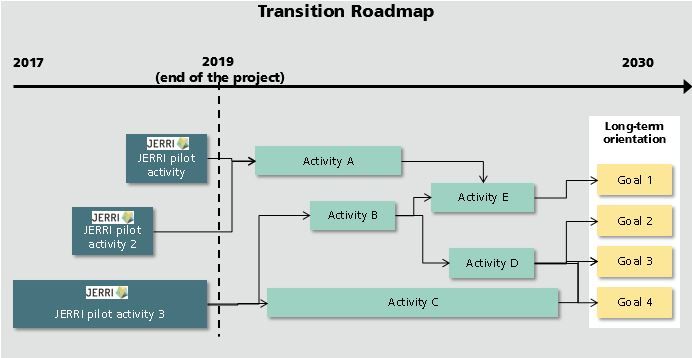RRI Transition Roadmaps
Both organizations developed transition roadmaps detailing pathways from today’s pilots to the envisaged long-term goals to guide the process beyond the project’s lifetime. In the following, we present the results of the Roadmapping Workshops for each RRI dimension.

Ethics
The transition roadmap specifies the key steps to be initiated after the ending of JERRI
in order to achieve the vision.
Mid-term time horizon (up to 5 years)
- Promote the JERRI ethics guidelines developed for the pilot activity 'Ethical Screening' (independently of its use in the pilot activity for assessment of the internal programming).
- Initiate discourses, raise awareness (building on JERRI pilots).
- Strengthen individual competences (building on JERRI pilots).
- Pomote general sample cases of ethical conduct (e.g. via the internal staff magazine “Quersumme”).
- Make known the possibility to decline research requests from clients.
- Prioritize these activities that may cause a snowball effect.
- Define clear fields of action, e.g. in line with strategic initiatives.
- Establish transparent processes for the choice of partners and clients.
- Exploit momentum of transformative events (e.g. crisis in the science system due to ethical/normative violations, new science funding principles).
Long-term tme horizon (up to 10 years)
- Set standards.
- Soften goal conflicts: Establish ethics as a positive element of excellence and quality criterion rather than an additional burden.
- Drive forward deep cultural change: Strengthen a culture of actively dealing with
ethical questions.
Gender
Two core lines of activities emerged:
1. Building up competences for gender in research content
2. Providing targeted guiding material for gender sensitive research
The following steps would be required:
- Competence Analysis (What competences do we need and where?) E.g.: Fraunhofer-specific expertise that combines disciplinary and gender competence
- Validation (What do we already have? Where?) Forming of Portfolio groups
- Development: Recruiting/Training to establish the required portfolio groups 23 Possible outcomes could be:
- Establishment of specific training programmes esp. for multipliers
- Establishment of gender competence as a cross-sectoral issue in all trainings (on- and offline), especially for new employees
- Initiation of working groups for gender competencies on institute level
Societal Engagement
Three focus areas for action emerged:
1. Competence building and bundling
2. Positioning and networking in the environment
3. Bottom-up cultural change in Fraunhofer
Mid-term time horizon (up to 5 years)
- taking on the dialogue formats developed in previous activities in the context of sustainability
- exchange of experience with universities
- refurbishing and using already existing knowledge and structures of the Fraunhofer-Gesellschaft
- developing a joint handout from Fraunhofer CeRRI/Fraunhofer IAO/Fraunhofer UMSICHT
- showing relevance of participation at specific topics
- tracking and showing permanently the benefit/impact of RRI-research through empirical surveys
- pushing a network between active pioneer institutions
Long-term tme horizon (up to 10 years)
- prove of added value of participative innovation processes through scientific surveys
- pushing competence development from pioneer institutes
- for competence development: development of transparent evaluation criteria of participation
- mobilizing transition agents - drafting position papers/white paper (in linkage to strategic actions)
- using the annual event 'Netzwert' of Fraunhofer for exchanging the experiences between institutes
- developing a business-case for RRI in which Societal Engagement is an integral part
- increasing human resources and resources in terms of finance and time (on all levels)
- cultural change on the institution level: a broader opening towards the public
- development of strategic alliances for Societal Engagement outside the Fraunhofer-Gesellschaft
Open Access
The following three main action fields were identified:
1. Open Access as a sign for scientific quality and as a part of the culture of science disciplines
2. Developing guiding and informational material, standardized publishing processes and introducing incentives for Open Access publishing
3. Competence building and bundling
Short-term time horizon:
- support by higher management - integration of Open Access in digital business process
- extension of the publication fund - developing a social media strategy
- (individual) reputation management
- “good” journal structures
Medium-term time horizon:
- progressive communication strategy
- transferring the Open Access idea into the cultures of the institutes
- prominent advocates in the realm of science, who support
- pioneers identify testimonials
- identifying multipliers from the scientist stuff
- Open Access specialist careers
- fostering networking between Open Access pioneers
- expert associations as a driving force
Long-term time horizon:
- digital implementation of Open Access infrastructures
- standard publication process for all tools
- full integration of Open Access in science indicators
- Open Access as an important part of science monitoring -> a high share of Open Access publications is something to be proud of and “brag”, e.g. within the sustainability report.
- possibilities for long-term save of data
Überschrift
Furthermore, the JERRI PROJECT indicated potential synergies between the different RRI dimensions:
- integration of gender aspects and participation requirements into ethical reflection guidelines; participation as an enabler for ethical reflection
- 'Fraunhofer debate' and 'citizen office' could also serve as chance to get in touch with the ethical values of civil society. This should also influence the internal value setting and ethical reflection within Fraunhofer.
- integration of Science Communication aspects into the ethical qualification programme in order to create a responsible and appropriate idea of new technologies/products in the public but also for potential customers
- easier access to scientific knowledge also improves the outcomes of societal engagement activities.

This project has received funding from the European Union's Horizon 2020 research and innovation programme under Grant Agreement No. 709747.
